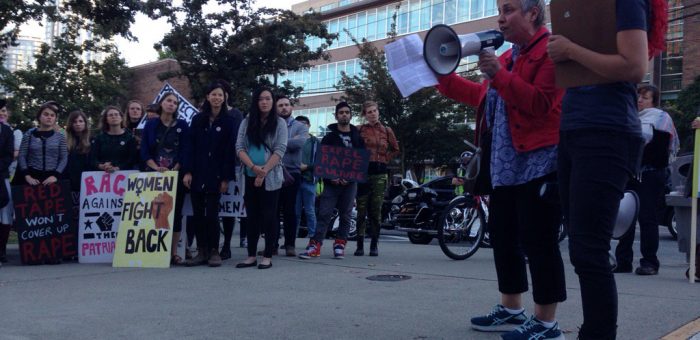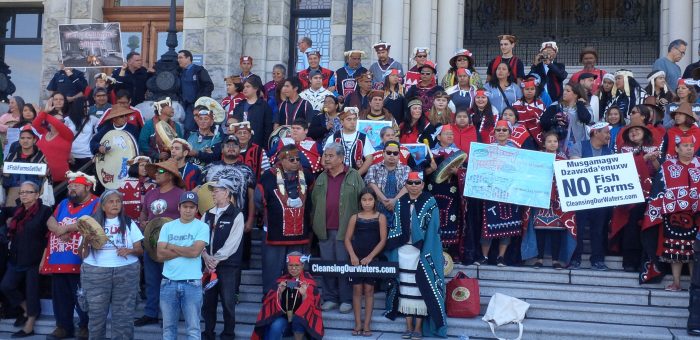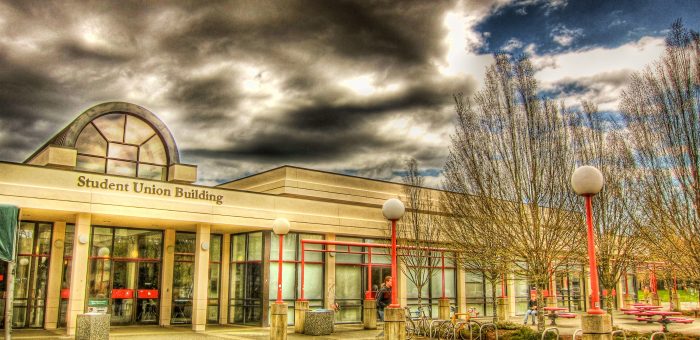Issues & Community Blog - Andrew Weaver: A Climate for Hope - Page 113
Applauding Grizzly Bear Foundation inquiry
Media Statement: September 8th, 2016
Weaver applauds Grizzly Bear Foundation inquiry
For Immediate Release
Victoria B.C. – “I welcome the Grizzly Bear Foundation’s inquiry into the status and future of grizzly bears in British Columbia and am supportive of the critical lens through which they are looking at this complex issue,” says Andrew Weaver, the MLA for Oak Bay – Gordon Head and Leader of the B.C. Green Party.
“Expanding our focus beyond trophy hunting is essential. While it is certainly an important factor, both morally and symbolically, and one I do not support, talking about trophy hunting alone is not enough. If we fail to also address poaching and threats to grizzly habitat and food supplies — especially with climate change further compromising essential salmon and huckleberry stocks — we will fail to protect grizzly bears in the long term.
“I am thrilled the Grizzly Bear Foundation shares this view and is so dedicated to the long term survival of grizzly bears in British Columbia, as well as the respectful inclusion of all stakeholders.
“The protection of wildlife and biodiversity for future generation is an issue that is of great importance to me. My research staff and I have worked on this file since I was first elected; we will continue to do so into the upcoming election. Combined with the Auditor General’s report, this new inquiry will lead to positive changes in how we manage and respect grizzlies and other wildlife in B.C.
“I look forward to attending the public hearing in Victoria this October.”
Media Contact:
Mat Wright – Press Secretary, Andrew Weaver MLA
mat.wright@leg.bc.ca
1 250 216 3382
Take back the campus: A march to end sexualized violence
On Tuesday, the WAVAW Rape Crisis Centre held a rally in Vancouver to kick off the school year with a call for post-secondary institutions to address sexualized violence and support survivors on campus. I was invited to speak at the event but, unfortunately, was not able to make it over to Vancouver on that dat so I sent the organizers a copy of the speech I had prepared.
Below is a transcript of the speech that their Executive Director Irene Tsepnopoulos-Elhaimer graciously read on my behalf.
Text of Speech
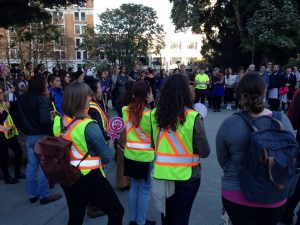 Please accept my apologies for not being able to participate in this important event in person today. I would have loved to attend but unfortunately I have commitments in Victoria.
Please accept my apologies for not being able to participate in this important event in person today. I would have loved to attend but unfortunately I have commitments in Victoria.
I am pleased to have been offered the opportunity to send along some information about the legislative progress that has been made relating to sexual assault policies over the past six months.
First, please let me provide some context on how I got involved with this topic – for most of my life I have either studied at or worked on university campuses around the world. For the last two decades, I have been a professor at the University of Victoria, the same university I attended as an undergrad in the 1980s.
My professional responsibilities are now largely centered around the legislature and my position as the MLA for Oak Bay – Gordon Head and Leader of the BC Green Party. But I still spend a great deal of time working with, and speaking to, students and young adults and have been absolutely sickened with the seemingly endless wave of stories about sexual assaults happening on and close to universities and other post-secondary campuses in B.C.
This past Spring I arrived back at my legislative office after a meeting in Vancouver to find my staff eagerly waiting for me with a campaign pitch and copies of Ontario legislation on their desks.
“Sexualized violence is a massive issue in B.C.”, they started, “and there is so much we can do to improve the situation – starting with colleges and universities.” One sentence in and I was on board. We immediately got to work, reviewed Ontario’s Action Plan to Stop Sexual Violence and Harassment, and drafted up a B.C.-version of their Sexual Violence and Harassment Action Plan Act.
We compiled a list of over 50 student societies, assault support centres, and key people across the province and contacted each one for input.
On March 8 I introduced Bill M205: Post-Secondary Sexual Violence Policies Act. The bill, based on similar legislation introduced in Ontario, was designed to address the pervasive occurrence of sexualized violence plaguing universities, colleges and other post-secondary institutions in British Columbia.
Noting that many post-secondary institutions lack sexual-assault policies, few have on-campus sexual assault crisis centres, and hardly any collect related incident data, the bill was designed to create a legal responsibility for universities and colleges to develop and maintain policies that would work to prevent the occurrences of sexual violence and provide support for victims.
The act would also require university and college-specific policies to be developed that would meet the needs of students, including education and protection, while working to create a safe environment for all students to come forward to report a sexual assault.
With an estimated one in three women and one in two transgender individuals experiencing sexual assault in their lifetime, this is a community issue that desperately needs to be addressed and post-secondary campuses present a unique opportunity to intervene.
The week after I tabled the Post-Secondary Sexual Violence Policies Act I followed up with the Premier in question period.
Noting that action on this issue was long overdue, she pledged to work with me to officially pass a version of my bill – urgently before the spring legislative session ended in May. I was thrilled with the progress on this pressing issue. I have since met with the Minister of Advanced Education to discuss next steps in moving this forward, and will continue to consult with students, survivors, support groups and university faculty and staff to make sure their voices are included as we build these laws. Sexualized violence in our communities is a huge problem, but it is important to remember that it is also a problem with incredible potential for progress.
With the start of the school year upon us it is important to remember that your universities and colleges are now legally obligated to develop and maintain policies that would work to prevent the occurrences of sexual violence and provide support for victims. These policies must be developed in consultation with the student body, and they need to be implemented by this coming Spring – one year from when the bill passed. If you feel that your school is not fulfilling their responsibilities, engage with your student society, ask the administration what policy progress has been made and how you can provide input to the policy development process. If you have additional concerns, you are always welcome to call my office at the legislature.
I am grateful to be able to work on this crucially important issue and owe a debt of gratitude to the incredibly courageous survivors of sexualized violence who have spoken out and help move us all forward.
Thank you for giving me the opportunity to provide a few remarks, I wish you all a successful and safe term!
Photos by Jeremy Lye
Standing with the Musgamagw Dzawada’enuxw Nation on Open Net Salmon Farming
Today I had the distinct honour of standing with the Musgamagw Dzawada’enuxw Nation in demanding the removal of open net fish farms from their traditional territories. I went one step further in stating that a BC Green government would ensure that those holding permits for open net fish farming along the migratory route of wild sockeye salmon would be given 90 days notice that their permits would be revoked. In addition, and unlike both the BC NDP and the BC Liberals, the BC Greens will not accept corporate donations from those involved in the open-net Atlantic Salmon farming industry,.
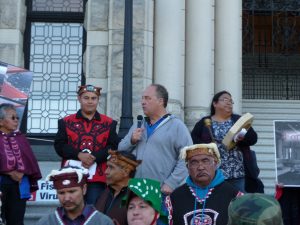 It’s not that the Musgamagw Dzawada’enuxw Nation and I are alone. In May 2015 I introduced a petition by 108,848 people who asked the government to please not issue licenses of occupation to salmon farms trying to expand in British Columbia. I also introduced a second petition signed by more than 100 business organizations across the province who supported the individuals who signed the larger petition. The business organizations argued that they are convinced by the published scientific evidence that open net salmon farms are a threat to B.C. wild pacific salmon.
It’s not that the Musgamagw Dzawada’enuxw Nation and I are alone. In May 2015 I introduced a petition by 108,848 people who asked the government to please not issue licenses of occupation to salmon farms trying to expand in British Columbia. I also introduced a second petition signed by more than 100 business organizations across the province who supported the individuals who signed the larger petition. The business organizations argued that they are convinced by the published scientific evidence that open net salmon farms are a threat to B.C. wild pacific salmon.
This doesn’t mean that we have to shut down salmon farming. Rather, it means that we have to start using closed containment systems that pose no threat to our wild salmon. In fact, we need look no further than the Namgis First Nation on Vancouver Island who have initiated a sustainable land-based salmon farming industry on their traditional lands.
Designated long-term rental units desperately needed
Skyrocketing real estate markets across the Lower Mainland and Southern Vancouver Island are dragging the rental market with them.
Frances Bula recently wrote in The Globe and Mail, “as people are shut out of the housing market, more people have no choice but to remain as renters who are competing for a limited supply of housing in a system that has treated renters like second-class citizens for decades.”
She’s right, and for people who are young, non-white, have mental health issues, unemployed, recent immigrants, poor, disabled, or have pets, finding a safe, affordable home can seem nearly impossible in markets with vacancy rates around 0.6 per cent like Victoria.
With constrained real estate mobility, people have little choice but to stay in suites that would have previously been viewed as shorter-term student rentals and I am getting increasingly concerned about where the young people in my riding are going to live this upcoming school year. A representative from Camosun College told us he too is very worried about the situation and described it as a complete crisis with some students living in cars and others forced into overcrowded, expensive shared suites.
We so desperately need more designated long-term rental units in B.C. Spaces that people can make their home, places that welcome children and pets and have some outdoor space. Homes for people who will rent for large portions of their life, either by necessity or choice.
Co-operative housing arrangements are another promising avenue to bridge the gap between the rental and homeownership markets. They provide shareholders with a long-term, sustainable home and create diverse communities, supporting multi-generational residents of varying income levels.
Unfortunately, few co-operative housing developments have been built in B.C. since the 1990s when the federal government released its social housing responsibility to the province and existing units have multi-year waitlists. Given our current housing crisis, and the province’s new Housing Priority Initiatives Fund, I think the B.C. Liberals, in conjunction with municipalities and the federal government, need to step in to help housing co-operatives with land acquisition and planning costs.
Each level of government has various tools available to them that they can use to tackle the housing crisis from different angles. To guide these initiatives we need, and have needed for years, more comprehensive data about the trends impacting our housing market. The information about buyer nationality that the province began collecting this June is a start, but making major policy decisions based on five weeks of data – as the B.C. Liberals did with Bill 28 – is far from ideal.
Knowing that we are going to be faced with challenging housing decisions for years to come, we need to start collecting more data now so we can design informed policy for the future. Determining who is purchasing homes, and how many, in B.C. would allow the government to identify the flow of foreign investments, the role corporations are playing, and whether we are seeing speculation in our market coming from other regions in Canada.
Tracking house flipping (when investors buy a house to quickly resell it at higher price) is an important aspect of understanding an over-inflated market. Imposing a sales tax on homes sold within one or two years of purchase could be an effective way of curbing house flipping but, again, it is a policy that should be founded in comprehensive data.
Studying the impact of Airbnbs, I suspect, would shed a lot of light on changes happening in the rental market. Airbnb has already said it’s open to some restrictions tailored to tight rental markets, including banning hosts from using the popular online platform to run a business renting out multiple units, but governments (municipal and provincial) will need solid data to move forward with such policies.
Long-term and ongoing data collection is vital to the future of homes in B.C. – the sooner we start the better.
Feature photo by Josefontheroad.
Rental market crisis taking root in B.C.
When I analyzed the rental market in my riding of Oak Bay and Gordon Head, in the Greater Victoria area, I wasn’t surprised by how bad it has gotten.
I know the rental availability rate is at 0.6 per cent in Victoria, I have spoken to residents desperately trying to find an affordable home, I have watched skyrocketing housing prices drag the rental market with them, I have heard about homeless UVic and Camosun students sleeping in cars. I wasn’t surprised as I looked through the rental listings on Craigslist, but I was very angry.
For several years now I have been raising housing issues in the legislature. The government has responded dismissively, refusing to acknowledge the housing crisis that loomed before us.
Now, fresh into an election year, protecting the dream of homeownership has apparently become their motto. They are throwing hastily put together, Vancouver-centric band-aid policies at a housing emergency that is reverberating through the entire province.
The B.C. government has failed to protect a fundamental right for British Columbians, and with the start of the school year fast approaching I am getting increasingly concerned about where the university and college students in my riding are going to live. The University of Victoria alone enrols over 21,000 students. Many UVic and Camosun students will live in residence or with family – UVic has about 2,300 residence beds and 180 family housing units but many others will need to find somewhere to rent for the year.
On Aug. 9 my office went through every Oak Bay and Gordon Head rental listing on Craigslist. There were only 106 and they ranged from $700 per month for a one-bedroom basement suite to $10,000 for a six-bedroom house.
Of the 106 listings, 29 fit my vaguely affordable cutoff of less than $1,000 monthly per person. Most of them were multiple bedroom suites that would have to be split between roommates.
The $2,700 three-bedroom unit, for example, could be shared at $900 per occupant. Not exactly cheap for a student without an income, but more attainable than the $1,500 being charged for a 450-square-foot basement suite. With so few listings, though, I do worry that student renters will be chosen last when bidding against professionals or families. I had a staff member contact a few of the listings that I thought would be suitable for roommates to ask if they would consider renting to a group of students and none replied.
For individuals or couples hoping to find a one-bedroom suite for under $1,000 in my riding, on the day I checked there were seven listed. Some listings welcomed higher bids and many apologized for not being able to respond to every inquiry, citing an overwhelming number of applications. But frustrations with the rental market should not be deflected onto landlords, they too are trying to manage costs in an unhinged housing market.
Frustration, anger and outrage about housing in B.C. needs to land squarely with the B.C. government for actively neglecting this issue until it became a crisis.
As Frances Bula wrote in The Globe and Mail, the housing market has long treated renters like second-class citizens and the current housing shortage is further excluding people who are young, non-white, have mental health issues, unemployed, recent immigrants, poor, disabled or have pets. Our government needs to move beyond their dream of homeownership talking point. There is a rental market crisis in British Columbia that is in desperate need of attention. We need policies that work to get people into safe, affordable homes – like those I have repeatedly outlined for the government – and we need it to start now so that come September students won’t be left sleeping on library benches.
Feature image by Nick Kenrick


